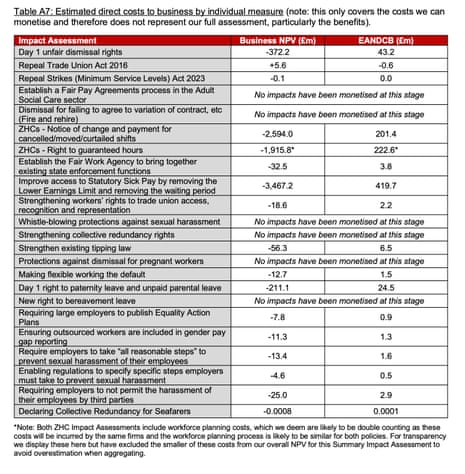Employment Rights Bill to cost firms £5bn annually, but gains will justify it, says government

The Department for Business and Trade has said the benefits of the employment rights bill will justify the costs it will impose on business amounting to nearly £5bn per year.
It has set out this assessment in an economic analysis of the bill, published alongside 24 regulatory impact assessment setting out the direct costs of the measures included in the legislation.
The bill, which is getting its second reading in the Commons this afternoon, has been described as “the biggest overhaul of workers rights in generations”. It will significantly strengthen workers’ rights.
In its economic analysis, the government says that some of these new regulations will impose new costs on business.
We expect the policies covered within the bill to impose a direct cost on business equivalent to low billion pounds per year. If we take the top-end of the range from our broad order of magnitude cost to business estimates in tables A3, A4, and A5 to get the maximum likely cost this sum to £4.5bn [sic]. As such, we are confident that the total direct cost to business will be less than £5bn annually. This represents a cautious assessment, and we expect the total cost to business to be refined downwards as our evidence improves and the policy development continues
Nevertheless, to contextualise the size of this impact, total wage costs in the UK were £1.3 trillion in 2023 in nominal terms, meaning that an annual cost of up to £5bn is equivalent to an uplift of the UK’s total pay bill of up to 0.4%. This cost will be concentrated on employers in lower paid sectors, but even if we assumed all of this cost falls on such sectors, then hypothetically the equivalent uplift in the wage bill for that part of the economy would be up to 1.5%.
The report says the empirical evidence about who would pay the cost of stronger employment protections is “ambiguous”. It says firms might pass on higher costs to customers. If they cannot do that, they might cut investment or training costs, or cut employment costs, it says.
But the report says giving workers more rights will cut the number of days lost to stress, depression and anxiety, which it implies will more or less compensate for the increase in direct costs. It says:
There will be further benefits for those in work from better job satisfaction, as well as improved wellbeing and health, which could be amount to billions of pounds a year. This will benefit their employers too as 17.1 million working days were lost due to stress, depression or anxiety in 2022/233 , equivalent to over £5bn of lost output.
And the report says, overall, the impact of the bill will be positive.
There are clear, evidence-based benefits of government action through the bill. Not acting would enable poor working conditions, insecure work, inequalities and broken industrial relations to persist.
The bill will strengthen working conditions for the lowest-paid and most vulnerable in the labour market, increasing fairness and equality across Britain. It will have significant positive impacts on workers who are trapped in insecure work, face discrimination, or suffer from unscrupulous employer behaviour like ‘fire and refire’ practices. [See 2.52pm.] Many policy changes in the bill will target the issues identified by the independent Taylor review of modern working practices.
Workers in adult social care, those covered by collective bargaining agreements, those grieving a loss of a loved family member, and those struggling to make work fit in around other commitments will also be notable beneficiaries …
The package will be significantly positive for society (i.e., the benefits will outweigh the costs) if policy implementation is well-targeted, and the risks of unintended consequences are mitigated through consultation and policy design. We intend to refine this assessment as policy development continues.
Impact assessment of employment rights bill measures on business – showing impact over 10 years (Business NPV) and annualised impact (EANDCB) Photograph: Business Department
Read more similar news:
Comments:
comments powered by Disqus

































